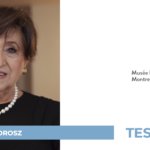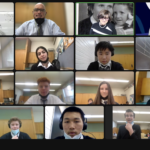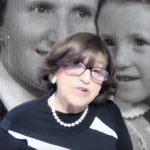Angi Orosz was born December 21, 1944, in Auschwitz-Birkenau, one of a handful of Jewish babies born in the camp who was able to survive. Her mother Vera Bein gave birth to Angela in that terrible place, and as Angi says in her testimony she speaks to honour her mother’s determination and fight to survive, and to remember her. Angi’s parents were living their young married life in Sarospatak, in eastern Hungary; they were doing well, even with the mounting restrictions of the wartime period. Then the German occupation of 1944 came, and Angi’s parents were forced into the ghetto, and from there they were put in a cattle car and deported to Auschwitz-Birkenau. Her parents were separated on the infamous platform, the last time they would see one another. Although pregnant, Angi’s mother was selected for work, and she went through the degradation of the arrival process – shaved, tattooed and sent into the barracks. She at first worked in Kanada, the barracks in the camp where the prisoners’ stolen belongings were kept; while the SS watched, she and the other workers sorted those items. She went on to do forced labour building a road, and then in the Auschwitz kitchen, a time where she was able to get a bit of extra food. She was in the orbit of Mengele by this time, and she was subjected to the cruelty of the Nazi doctor’s medical experiments. Then one fateful day Angi’s mother went into labour, and a fellow prisoner helped to deliver the tiny baby in the barracks, during the cold days of December 1944. Over the next month Angi’s mother kept her tiny daughter alive, and on January 27 they were fortunate to be liberated by the Red Army. After liberation they spent time in White Russia before returning to Hungary; Angi’s mother met and married another survivor, and they put Angi on the slow road to health and recovery. Angi grew up in Hungary, and for years the family attempted to get away from the communist regime; passports were finally granted and the family made its way to Canada, first to Toronto and then Montreal. Angi found her place in postwar Canada, marrying and raising her family, and ultimately sharing her and her mother’s story. Angi came to us courtesy of the Montreal Holocaust Museum, and Crestwood students were fortunate to interview over zoom in February 2022.
Videos
Click next video below to keep watching
















